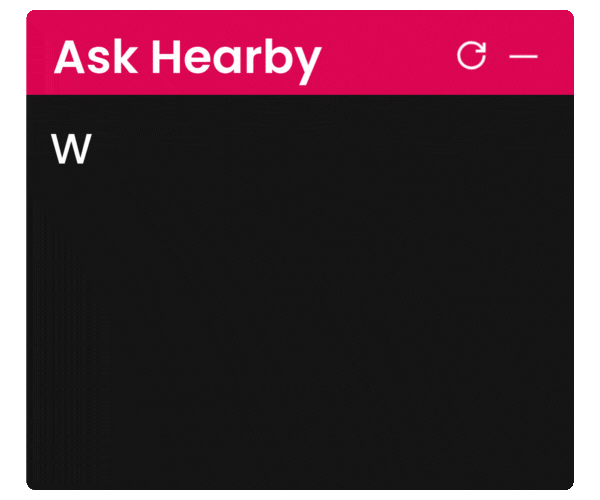AI-Powered Concert Listings? Hearby Just Generated an App for That

How much bigger can the global live concert space grow? Boston-based Hearby is betting that AI-generated concert searches can crack the discovery riddle and boost attendance across the board. Here’s a look at the just-launched ‘Ask Hearby.’
Ready for a break from AI infringement problems, endless legal battles, and dystopian nightmares? While most of the music industry is focused on the very serious threats posed by AI, a number of companies are playing in less problematic sandboxes and making serious strides.
That includes Hearby, an AI-focused music braintrust owned by Area4Labs in Boston. The company is focused on concert-related applications driven by AI, with an eye towards resolving decades-old issues. Just recently, Hearby joined forces with DMN to accelerate its mission.
As Chat GPT doesn’t provide information on live events, the group has a mission to solve the giant discovery gap that exists in live music, particularly for music fans who are surrounded by great music but often lack awareness of what’s out there.
“Giant shows for artists like Beyoncé and Taylor Swift are only one-third of the market,” Area4Labs cofounder Ian Condry relayed. “The rest of live music events in smaller venues is scattered and difficult to find.”
Suddenly, AI is doing something great – helping people find gigs and discovering new artists. It’s a refreshing change of pace.
If you’ve stumbled on a great jazz set in your neighborhood – or worse, didn’t realize an artist you love played last night – then you’re one of millions of music fans Hearby wants to help.
Enter ‘Ask Hearby,’ a first-to-market AI chatbot for live event discovery.
Ask Hearby taps into Large Language Model (LLM) AI technology and decades of anthropology expertise to properly match intent with great gigs. On the LLM front, Hearby has been tinkering with this tech for more than five years, according to details shared with DMN.
The end goal, according to the company, is to simulate a knowledgeable friend offering curation of local gigs.
Actually, the goal is to supercede that benchmark, given that a knowledgeable music fan is likely to offer recommendations based on their specific preferences and favorite venues, not yours.
The result is – voila! – an AI chatbot specifically designed for discovering live events. Based on specific prompts, Ask Hearby shakes the tree on what’s out there, effectively shifting discovery beyond personal recommendations, chance encounters, and limited online apps.
“This is the first of its kind in the live event discovery space,” said Area4Labs CEO Gary Halliwell. “Our coverage of live music shows across UK cities and towns is second to none, and we look forward to extending discovery of North American shows in 2025.”
That’s completely different from more closed-end AI chatbot systems like Satisfi, which focus on providing support details after concert tickets have been purchased. Shifting the timeframe to the moments before a ticket is purchased, and the challenge becomes exponentially more challenging.
We tested Ask Hearby out by asking for live events in our area.
The results were interesting: some local jazz spots were highlighted alongside some lesser-known alternatives. That includes restaurants that added trios or pianists to accentuate the ambience, which can be tricky to find.
There were also a few misses, depending on your perspective: Azealia Banks was noted as a jazz option, perhaps based on a line in her biography referencing jazz as an influence. That type of result could lead to some disappointing results for concertgoers, though Ask Hearby will learn what’s relevant – and what isn’t – over time.
The next step in Ask Hearby’s development arc involves serious personalization.
Based on your repeated searches and results, the company envisions generating personally curated show lists that can be shared on social media. Suddenly, fans aren’t limited to a few mega-shows at $150 a pop. Instead, the options will include more local gigs, up-and-coming artists, and hole-in-the-wall jazz trios more accessible than ever.
Link to the source article – https://www.digitalmusicnews.com/2024/12/19/hearby-ai-concert-listings/
Recommended for you
-
IK Multimedia iRig HD 2 guitar audio interface for iPhone, iPad, Mac, iOS and PC with USB-C, Lightning and USB cables and 24-bit, 96 kHz music recording
$119,99 Buy From Amazon -
JBL Professional LSR310S – Studio Monitor Subwoofer, 10-Inch, Black
$0,00 Buy From Amazon -
JBL LSR310S 10″ 200w Powered Subwoofer Ported Studio Sub+Mic+Headphones+Riser
$418,90 Buy From Amazon -
Youtooz Banjo Kazooie Vinyl Figure, 4.5â Action Figure, Banjo The Bear with his Friend Kazooie The Red Bird Banjo Kazooie Figure Collection Based on Famous Video Game
$69,97 Buy From Amazon -
AODSK Electric Drum Set with Quiet Mesh Pads,Electronic Drum for Beginner,USB MIDI,Throne,Headphones,Sticks, Included 15 Kits and 195 Sounds,AED-403
$259,99 Buy From Amazon -
SINOPRINT E310 E310dw Drum, Compatible Replacement for Dell E310dw E514dw E515dw E515dn E515 E514 Drum Unit (Dell PVTHG, 593-BBKD, P7RMX) High Yield 12,000 Pages (2-Pack)
$38,99 Buy From Amazon -
Gold Tone OM-800+ Octave Mandolin (Mahogany)
$899,99 Buy From Amazon -
LyxPro Electric Guitar Amp 20 Watt Amplifier Built in Speaker Headphone Jack and Aux Input Includes Gain Bass Treble Volume and Grind – Black
$49,99 Buy From Amazon















Responses